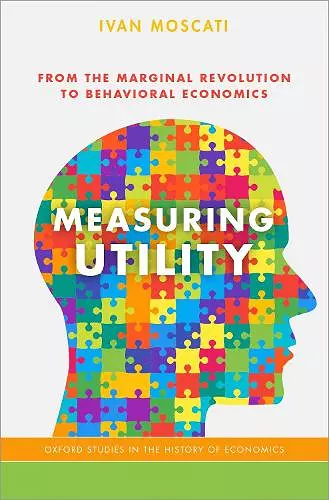Measuring Utility
From the Marginal Revolution to Behavioral Economics
Format:Paperback
Publisher:Oxford University Press Inc
Published:3rd Jan '19
Currently unavailable, and unfortunately no date known when it will be back
This paperback is available in another edition too:
- Hardback£98.00(9780199372768)

Utility is a key concept in the economics of individual decision-making. However, utility is not measurable in a straightforward way. As a result, from the very beginning there has been debates about the meaning of utility as well as how to measure it. This book is an innovative investigation of how these arguments changed over time. Measuring Utility reconstructs economists' ideas and discussions about utility measurement from 1870 to 1985, as well as their attempts to measure utility empirically. The book brings into focus the interplay between the evolution of utility analysis, economists' ideas about utility measurement, and their conception of what measurement in general means. It also explores the relationships between the history of utility measurement in economics, the history of the measurement of sensations in psychology, and the history of measurement theory in general. Finally, the book discusses some methodological problems related to utility measurement, such as the epistemological status of the utility concept and its measures. The first part covers the period 1870-1910, and discusses the issue of utility measurement in the theories of Jevons, Menger, Walras and other early utility theorists. Part II deals with the emergence of the notions of ordinal and cardinal utility during the period 1900-1945, and discusses two early attempts to give an empirical content to the notion of utility. Part III focuses on the 1945-1955 debate on utility measurement that was originated by von Neumann and Morgenstern's expected utility theory (EUT). Part IV reconstructs the experimental attempts to measure the utility of money between 1950 and 1985 within the framework provided by EUT. This historical and epistemological overview provides keen insights into current debates about rational choice theory and behavioral economics in the theory of individual decision-making and the philosophy of economics.
...the book is strikingly precise and sharp...It provides a compendium of past ideas on measurement that is nearly exhaustive. * Thomas Müller, European Journal of the History of Economic Thought *
Measuring Utility is the most comprehensive history of utility measurement in economics that currently exists. * Catherine Herfeld, Economics & Philosophy *
[Measuring Unity] should be read by any researcher making use of the concept of utility in their work, but I think it has a much broader appeal. I cannot think of another work in behavioral economics that so carefully scrutinizes the emergence of a key idea and gives us the knowledge needed to further develop our own thinking. Moscati's book will be very influential. * Daniel Read, Journal of Economic Literature *
Modern ideas on utility, including behavioral and choiceless interpretations, cannot be understood without knowing the past, including the marginal and ordinal revolutions. This book, written by the greatest historian on these topics, gives a full and perfect account. It is a must for everyone who really wants to understand modern economics. * Peter Wakker, Professor in Behavioral Economics, Erasmus University Rotterdam *
For almost a century, from the 1880s until the 1970s, the best minds in economic theory struggled to solve the problem of measurability of utility.During this long journey they not only provided new mathematical foundations to Neoclassical economics, but also redefined its boundaries, and changed the very notion of measurement that lies at the core of contemporary science. Reconstructing the story of this remarkable achievement, Ivan Moscati has made a lasting contribution both to the history and to the philosophy of science. * Francesco Guala, University of Milan *
Ivan Moscati has given us an extremely important history of utility theory, measurement theory, and the relationship between the two for the period from the marginal revolution in the 1870s to the behavioral economics revolution in the mid-1980s. It is a badly needed book, on a very important topic, that deals with difficult interdisciplinary material, and it is brilliantly executed. * D. Wade Hands, University of Puget Sound *
ISBN: 9780199372775
Dimensions: 152mm x 231mm x 20mm
Weight: 476g
344 pages